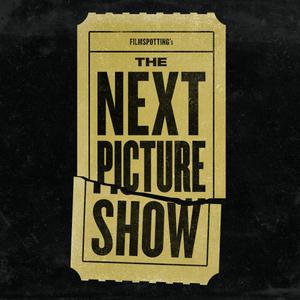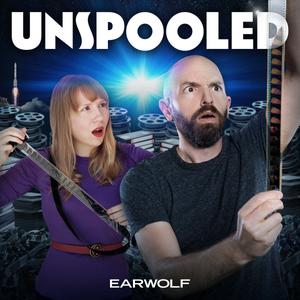
The Next Picture Show
Filmspotting Network
Looking at cinema's present via its past.
- 1 hour 3 minutes#458: Fanged Attraction, Pt. 1 — Bram Stoker's Dracula
The heightened gothic sensibility of Robert Eggers’ new NOSFERATU recalls — in its intensity if not its precise contours — BRAM STOKER’S DRACULA, Francis Ford Coppola’s feverish 1992 horror-romance that follows the same story from a markedly different perspective. This led us to reconsider Coppola’s flawed but fascinating DRACULA as a film that, even if it arguably never achieves greatness, inarguably leaves an impression. Yes, Keanu Reeves’ accent is part of that impression, but so is the film’s grandiose art design, its recasting of Dracula as a tragic romantic antihero, and its overall commitment to cinematic maximalism, for better or worse.
Please share your comments, thoughts, and questions about BRAM STOKER’S DRACULA, NOSFERATU, and anything else in the world of film by sending an email or voice memo to [email protected], or leaving a short voicemail at (773) 234-9730.
Learn more about your ad choices. Visit megaphone.fm/adchoices
21 January 2025, 6:00 am - 37 secondsA Brief Interruption in Service
Hey Next Picture Show listeners, sorry there’s no new episode in your feed today. Real life got in the way of podcast life and prevented us from recording our next pairing in time to release it this week. But we will be back next Tuesday with part one of our double feature comparing Robert Eggers’ new Nosferatu with Frances Ford Coppola’s own take on Bram Stoker’s Dracula from 1992. If you’re playing along at home, the former is in theaters now, while Coppola’s Dracula is digitally rentable from the usual outlets, and available in an array of physical-media releases to purchase — or perhaps check out from your local library. We hope you’ll enjoy both movies, and join us next week as we sink our teeth into this pairing.
Learn more about your ad choices. Visit megaphone.fm/adchoices
14 January 2025, 6:00 am - 1 hour 7 minutes#457: Our Top Films of 2024
With the beginning of a new year comes our customary look back, as Keith, Scott, and Tasha gather once again to compare their personal lists of the best films of 2024. While there is some crossover among their picks — particularly when it comes to films that have been discussed in-depth on this podcast — there is much more variance, reflective of a movie year that was light on prestige-season heavyweights, and full of memorably idiosyncratic, personal projects that will stick with us long past year’s end.
Please share your thoughts about, and your own picks for, the best movies of 2024, or anything else in the world of film, by sending an email or voice memo to [email protected], or leaving a short voicemail at (773) 234-9730.
Next Pairing: Robert Eggers’ NOSFERATU and Francis Ford Coppola’s BRAM STOKER’S DRACULA
Learn more about your ad choices. Visit megaphone.fm/adchoices
7 January 2025, 6:00 am - 1 hour 4 minutes#456: Long Gone, Pt. 2 — Nickel Boys
The moments in NICKEL BOYS that nod to 1958’s THE DEFIANT ONES are less direct citations than stylized invocations by director RaMell Ross, who incorporates a number of abstractions and flourishes into the film’s visual language. Chief among those stylistic gambits is the film’s use of first-person perspective, which kicks off our discussion of NICKEL BOYS’ uniquely textured take on Colson Whitehead’s Pulitzer-winning novel. From there we consider the deeper meaning and intent behind NICKEL BOYS’ use of visuals and audio from THE DEFIANT ONES, and where the two films overlap in their ideas about racial justice in the Jim Crow South and clashing philosophies of idealism and realism. Then our returning guest co-host Noel Murray offers a Your Next Picture Show recommendation for another social-issue film from the team behind THE DEFIANT ONES.
Please share your comments, thoughts, and questions about THE DEFIANT ONES, NICKEL BOYS, and anything else in the world of film by sending an email or voice memo to [email protected], or leaving a short voicemail at (773) 234-9730.
Learn more about your ad choices. Visit megaphone.fm/adchoices
24 December 2024, 6:00 am - 1 hour 14 minutes#455: Long Gone, Pt. 1 — The Defiant Ones
Stanley Kramer’s 1958 feature THE DEFIANT ONES, a film very much of its time, makes multiple on-screen appearances in RaMell Ross’ new NICKEL BOYS, a film about the way the past haunts the present. Both movies take place in the Jim Crow-era South and engage with that setting’s lopsided ideas about justice, but THE DEFIANT ONES does so from a much more straightforward approach, operating as both a stylish thriller about two escaped prisoners, one black (Sidney Poitier) and one white (Tony Curtis), and an earnest allegory about interracial acceptance. That latter quality makes it easy to lump in with Kramer’s other “message movies,” which are often dismissed from a modern vantage point as stodgy and sanctimonious, so we’re revisiting THE DEFIANT ONES, with an assist from critic and pal Noel Murray, to see whether it earns or defies that reputation. And in Feedback we revisit our WIZARD OF OZ discussion with a reader suggestion of another child female protagonist who rivals Dorothy when it comes to teary helplessness.
Please share your comments, thoughts, and questions about THE DEFIANT ONES, NICKEL BOYS, and anything else in the world of film by sending an email or voice memo to [email protected], or leaving a short voicemail at (773) 234-9730.
Learn more about your ad choices. Visit megaphone.fm/adchoices
17 December 2024, 6:00 am - 1 hour 25 minutes#454: The Witch Is Back, Pt. 2 — Wicked
The antagonist becomes the protagonist in Jon M. Chu’s WICKED, which adapts a stage musical — the first act, anyway — which adapts a novel that flipped the script on 1939’s THE WIZARD OF OZ (itself an adaptation of L. Frank Baum’s novel). So while there are plenty of narrative and character parallels between the two films, they often run perpendicular to each other in their respective notions of good and wicked. But the two films are certainly aligned in their aim to be big-screen spectacles of the highest order, though opinions differ among our hosts as to what degree WICKED achieves that goal in its heavily CGI-ed and halved form. Following that debate, we pit Dorothy and Elphaba against each other to see what each protagonist has to offer when it comes to fish-out-of-water pluck, character-defining“I Want” songs, and willingness to trust in that scoundrel the Wizard. And for Your Next Picture Show, Scott wheels out a recommendation for one of the weirder, but strangely enduring, cinematic visions of Oz.
Please share your comments, thoughts, and questions about THE WIZARD OF OZ, WICKED, and anything else in the world of film by sending an email or voice memo to [email protected], or leaving a short voicemail at (773) 234-9730.
Next pairing: RaMell Ross’s NICKEL BOYS and Stanley Kramer’s THE DEFIANT ONES
Learn more about your ad choices. Visit megaphone.fm/adchoices
10 December 2024, 6:00 am - 1 hour 14 minutes#453: The Witch Is Back, Pt. 1 — The Wizard of Oz
The new movie musical WICKED, along with the Broadway show and novel that preceded it, is specifically out to subvert the version of the magical land of Oz that was codified in 1939’s THE WIZARD OF OZ, making it the perfect time to consider what made that film a phenomenon to be subverted in the first place. So this week we wade into the vast, varied legacy of THE WIZARD OF OZ to discuss why it overcame its initial box-office failure to become a perennial family classic; which of the film’s enduring elements feel most of their time; and how that “it was all a dream” framework contributes to the film’s appeal. And in Feedback, a listener hits us with some historical context regarding a question raised in our recent episode on THE BEST MAN.
Please share your comments, thoughts, and questions about THE WIZARD OF OZ, WICKED, and anything else in the world of film by sending an email or voice memo to [email protected], or leaving a short voicemail at (773) 234-9730.
Learn more about your ad choices. Visit megaphone.fm/adchoices
3 December 2024, 6:00 am - 1 hour 20 minutes#452: Cinde-F***ing-Rella, Pt. 2 — Anora
Sean Baker’s ANORA takes the fairy-tale premise of 1990’s PRETTY WOMAN as its starting point, but ends up on a very different route to a very different sort of happy ending. It’s also a best-of-the year contender for most of us, so we spend some time discussing what makes it so before bringing its romcom predecessor back in to consider how these two films about sex workers falling for their wealthy clients are in conversation when it comes to classicism and social hierarchies, conspicuous consumption, and what happens when a transactional relationship evolves into something more. And in Your Next Picture Show, we offer a pair of recommendations that illustrate the cinematic endurance of this particular premise.
Please share your comments, thoughts, and questions about PRETTY WOMAN, ANORA, and anything else in the world of film by sending an email or voice memo to [email protected], or leaving a short voicemail at (773) 234-9730.
Next Pairing: Jon M. Chu’s WICKED and Victor Fleming’s THE WIZARD OF OZ
Learn more about your ad choices. Visit megaphone.fm/adchoices
26 November 2024, 6:00 am - 1 hour 10 minutes#451: Cinde-F***ing-Rella, Pt. 1 — Pretty Woman
Sean Baker’s new ANORA takes its initial cues from 1990’s PRETTY WOMAN, but its story of a sex worker who develops romantic feelings for a client in spite of class difference and social stigma soon peels off in a vastly different direction. So this week we’re focusing on that shared starting point to determine what makes PRETTY WOMAN both a deeply weird depiction of sex work and a resoundingly successful romcom — and no, it’s not just Julia Roberts, though it’s hard to imagine us discussing PRETTY WOMAN as a classic film today without that star-making performance. And in Feedback, a listener question about theaters' embrace of faith-based films prompts a broader discussion of how and why multiplexes are diversifying their offerings.
Please share your comments, thoughts, and questions about PRETTY WOMAN, ANORA, and anything else in the world of film by sending an email or voice memo to [email protected], or leaving a short voicemail at (773) 234-9730.
Learn more about your ad choices. Visit megaphone.fm/adchoices
19 November 2024, 6:00 am - 1 hour 7 minutes#450: Ballot Wounds, Pt. 2 — Conclave
Edward Berger’s new CONCLAVE is a low-key, intimate political thriller full of unexpected reveals, but fundamentally about power, purity, belief, compromise, perception, and committee decisions. This week we share our thoughts on CONCLAVE’s insular focus and messaging around religion and politics before considering how its power brokers and kingmakers compare to those found in the 1964 presidential-candidate drama THE BEST MAN, and the two films’ overlapping ideas about whether politics demands hypocrisy. And for Your Next Picture Show, we offer a recommendation for THE DEATH OF STALIN, a radically different movie about the vacuum left when a powerful man dies, and the jockeying and chicanery that follows.
Please share your comments, thoughts, and questions about THE BEST MAN, CONCLAVE, and anything else in the world of film by sending an email or voice memo to [email protected], or leaving a short voicemail at (773) 234-9730.
Next Pairing: Sean Baker’s ANORA and Garry Marshall’s PRETTY WOMAN.
Learn more about your ad choices. Visit megaphone.fm/adchoices
12 November 2024, 6:00 am - 1 hour 7 minutes#449: Ballot Wounds, Pt. 1 — The Best Man
While the new CONCLAVE concerns the election of a new pope, its intrigue, backstabbing, and backroom deals have many echoes in secular politics, in particular those found in 1964’s THE BEST MAN. Directed by Franklin J. Schaffner and written by Gore Vidal adapting his own stage play, the film’s depiction of the behind-the-scenes machinations involved to secure an unnamed party’s nomination for the presidency is relevant both to its era and our current political moment, albeit in different ways. But how deep does its cynicism about the system of elections, and those who manage to make that system work for them, go? We talk through that, as well as how THE BEST MAN’s women function within that system, before taking on some listener feedback about streaming availability that doubles as an excuse to endorse a system we can all get behind: public libraries.
Please share your comments, thoughts, and questions about THE BEST MAN, CONCLAVE, and anything else in the world of film by sending an email or voice memo to [email protected], or leaving a short voicemail at (773) 234-9730.
Learn more about your ad choices. Visit megaphone.fm/adchoices
5 November 2024, 6:00 am - More Episodes? Get the App
Your feedback is valuable to us. Should you encounter any bugs, glitches, lack of functionality or other problems, please email us on [email protected] or join Moon.FM Telegram Group where you can talk directly to the dev team who are happy to answer any queries.
 Unspooled
Unspooled
 The Big Picture
The Big Picture
 The Filmcast
The Filmcast
 Filmspotting
Filmspotting
 Fighting In The War Room: A Movies And Pop Culture Podcast
Fighting In The War Room: A Movies And Pop Culture Podcast
 Blank Check with Griffin & David
Blank Check with Griffin & David